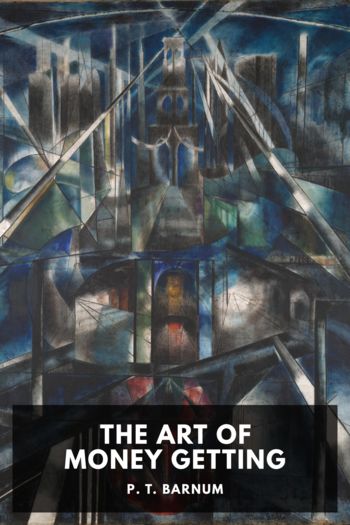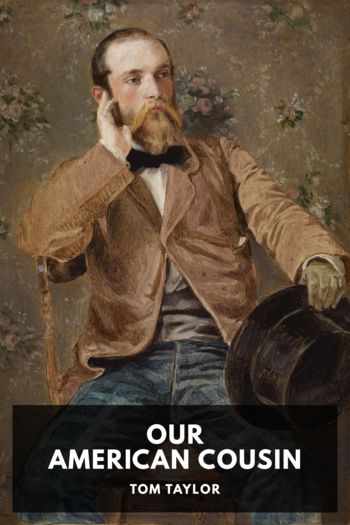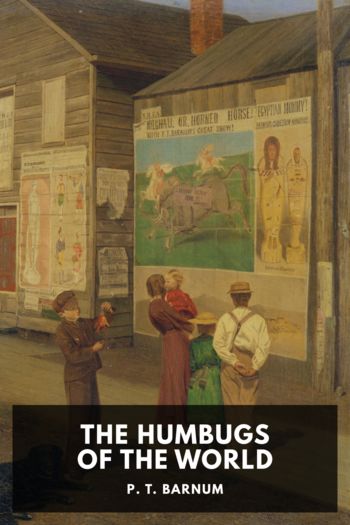Struggles and Triumphs by P. T. Barnum (love novels in english TXT) 📕

- Author: P. T. Barnum
Book online «Struggles and Triumphs by P. T. Barnum (love novels in english TXT) 📕». Author P. T. Barnum
“What kind of a house did you have last night?” asked one of the gentlemen in waiting.
“Oh, first-rate, of course. Barnum always draws a crowd,” was the reply of the ticket-seller, to whom I was not known.
Most of the gentlemen present, however, knew me, and they found much difficulty in restraining their laughter.
“Did Barnum make a good speech?” I asked.
“I did not hear it. I was out in the ticket-office. I guess it was pretty good, for I never heard so much laughing as there was all through his speech. But it makes no difference whether it was good or not,” continued the ticket-seller, “the people will go to see Barnum.”
“Barnum must be a curious chap,” I remarked.
“Well, I guess he is up to all the dodges.”
“Do you know him?” I asked.
“Not personally,” he replied; “but I always get into the Museum for nothing. I know the doorkeeper, and he slips me in free.”
“Barnum would not like that, probably, if he knew it,” I remarked.
“But it happens he don’t know it,” replied the ticket-seller, in great glee.
“Barnum was on the cars the other day, on his way to Bridgeport,” said I, “and I heard one of the passengers blowing him up terribly as a humbug. He was addressing Barnum at the time, but did not know him. Barnum joined in lustily, and endorsed everything the man said. When the passenger learned whom he had been addressing, I should think he must have felt rather flat.”
“I should think so, too,” said the ticket-seller.
This was too much, and we all indulged in a burst of laughter; still the ticket-seller suspected nothing. After I had left the shop, the barber told him who I was. I called into the ticket-office on business several times during the day, but the poor ticket-seller kept his face turned from me, and appeared so chapfallen that I did not pretend to recognize him as the hero of the joke in the barber’s shop.
This incident reminds me of numerous similar ones which have occurred at various times. On one occasion—it was in 1847—I was on board the steamboat from New York to Bridgeport. As we approached the harbor of the latter city, a stranger desired me to point out “Barnum’s house” from the upper deck. I did so, whereupon a bystander remarked, “I know all about that house, for I was engaged in painting there for several months while Barnum was in Europe.” He then proceeded to say that it was the meanest and most ill-contrived house he ever saw. “It will cost old Barnum a mint of money, and not be worth two cents after it is finished,” he added.
“I suppose old Barnum don’t pay very punctually,” I remarked.
“Oh, yes, he pays punctually every Saturday night—there’s no trouble about that; he has made half a million by exhibiting a little boy whom he took from Bridgeport, and whom we never considered any great shakes till Barnum took him and trained him.”
Soon afterwards one of the passengers told him who I was, whereupon he secreted himself, and was not seen again while I remained on the boat.
On another occasion, I went to Boston by the Fall River route. Arriving before sunrise, I found but one carriage at the depot. I immediately engaged it, and giving the driver the check for my baggage, told him to take me directly to the Revere House, as I was in great haste, and enjoined him to take in no other passengers, and I would pay his demands. He promised compliance with my wishes, but soon afterwards appeared with a gentleman, two ladies, and several children, whom he crowded into the carriage with me, and placing their trunks on the baggage rack, started off. I thought there was no use in grumbling, and consoled myself with the reflection that the Revere House was not far away. He drove up one street and down another, for what seemed to me a very long time, but I was wedged in so closely that I could not see what route he was taking.
After half an hour’s drive he halted, and I found we were at the Lowell Railway depot. Here my fellow-passengers alighted, and after a long delay the driver delivered their baggage, received his fare, and was about closing the carriage door preparatory to starting again. I was so thoroughly vexed at the shameful manner in which he had treated me, that I remarked;
“Perhaps you had better wait till the Lowell train arrives; you may possibly get another load of passengers. Of course my convenience is of no consequence. I suppose if you land me at the Revere House any time this week, it will be as much as I have a right to expect.”
“I beg your pardon,” he replied, “but that was Barnum and his family. He was very anxious to get here in time for the first train, so I stuck him for $2, and now I’ll carry you to the Revere House free.”
“What Barnum is it?” I asked.
“The Museum and Jenny Lind man,” he replied.
The compliment and the shave both having been intended for me, I was of course mollified, and replied, “You are mistaken, my friend, I am Barnum.”
“Coachee” was thunderstruck, and offered all sorts of apologies.
“A friend at the other depot told me that I had Mr. Barnum on board,” said he, “and I really supposed he meant the other man. When I come to notice you, I perceive my mistake, but I hope you will forgive me. I have carried you frequently before, and hope you will give me your custom while you are in Boston. I never will make such a mistake again.” I had to be satisfied.
Late in August, 1851, I was visited at Bridgeport by a gentleman who was interested in an English invention patented in this country, and known as Phillips’ Fire Annihilator. He showed me a number of certificates from men of eminence and trustworthiness in England, setting forth





Comments (0)